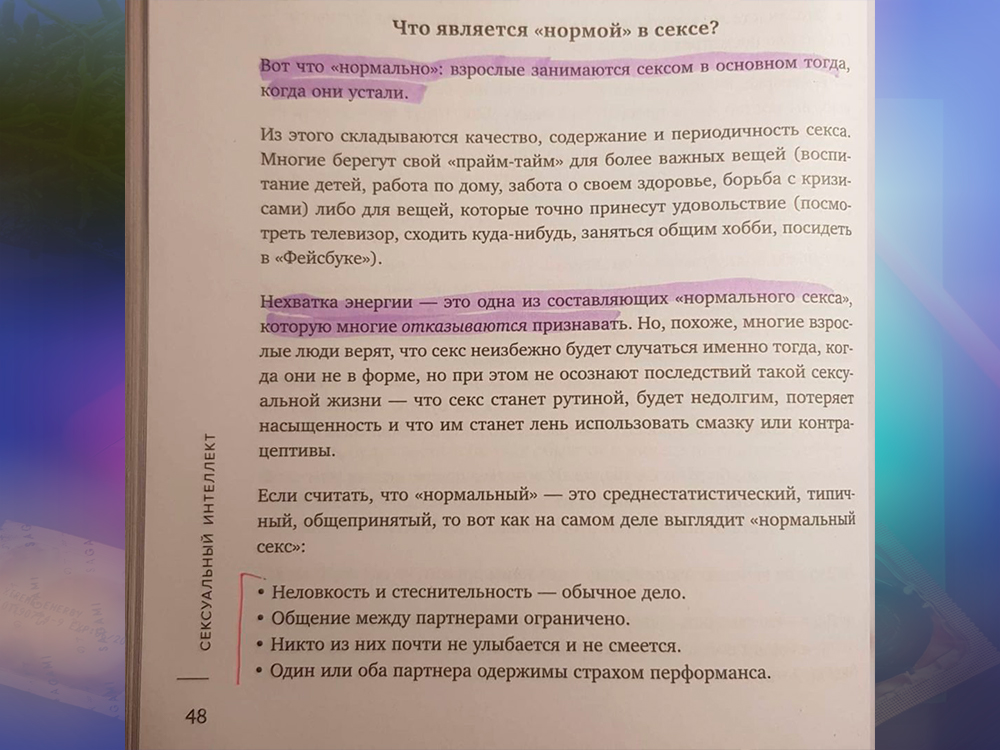Marty Klein “Sexual Intelligence”
bombora publishing house , book , review , maria chesnokova
Text and photo: Maria Chesnokova
If I was writing my book, it would be very similar to this one. The author helps to normalize any sex that occurs with the active consent of two adults. Sex is many cool possibilities, if we finally stop devaluing everything except the canonical “penis in the vagina”.
The author analyzes both female and male experiences associated with problems in bed. And this is very cool, because there is already a sufficient amount of literature about female sexuality, but little has been written about men. You can safely give this book to your partner, and together discuss the questions that interest you. And for those who want to talk openly about sex in their couple, but have not yet learned how to do it, the book can become a starting point. Plus, there are many examples from family therapy in which many couples recognize themselves.
What is Sexual Intelligence (SQ)? SI means that we come face to face with our sexuality, instead of hiding it, denying it or blaming it in some way. We are talking about it. We do not waste energy on experiences. It's like sex isn't what it should be. The main message of SI is to realize that your body will no longer have sex the way it was in your youth, or the way you imagined it in your head. But this is not a reason to give up sex altogether, on the contrary, this is the ability to get high from everything that happens.
SI is the concept of sex in which it is impossible to “fail” because there is simply no goal of “being successful”. When you don't align with some standard of normality, there are only two standards left: “Do I like this” and “Do my partner like doing this with me”. Loss of erection, dry vaginas, quick orgasms – these are all just features of sex, not a hindrance or failure. In such a world, there is no hierarchy that would argue that certain types of sex are better than others. We do not enjoy sex because we are perfect, but rather, despite the many imperfections that can be found in any sexual intercourse. Sexual pleasure is not created for ideal people, it is created for everyone.
The book is definitely needed by those who:
– thinks about “is everything okay with me” and “do I do everything like this?”;
– tries to have sex in a mystical "correct" way and gets upset about the results;
– feels insecure: “What if I'm fat for him”, “I have a small penis, nobody needs me”, “I have a weak erection”, “I can't get an orgasm”;
– has a fear of failure and because of unsuccessful attempts in the past is afraid to start;
– wants to stop worrying about and without, because sex is about pleasure, and not an additional source of anxiety;
– does not know how to “speak through the mouth” about sex, but really wants to learn;
– wants to know what kind of sex is better than another;
– reads that sex is something dirty.
(Spoiler. Your tongue has no idea if you are licking the “normal” or “lecherous” part of someone).
Cons of the book:
– no references to sources or research;
– in my copy there was a print fault with double pages, I hope this is not in the whole batch;
– I would like more practical exercises for the development of sexual intelligence;
– there is a certain amount of bullshit (slang term meaning an incorrect, incorrect statement – ed.);
– the strange idea that, according to statistics, most heterosexuals are not exposed to HIV;
– a description of emergency contraception as a panacea, without mentioning the possible harm and the need to consult a doctor. (EC is great, but shouldn't be taken out of control);
– a mention that penetrative sex is the only one that requires protection (it is not very clear what exactly the author meant: if pregnancy, then yes; and if an STI, then oral and anal sex also needs protection).
The book was written in 2012, and perhaps the statistics were really different then. And I forgive the author for some inaccuracies, because in all other respects the publication is amazingly beautiful.







Comments (0)
Чтобы оставлять комментарии, необходимо авторизироваться.